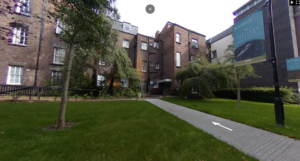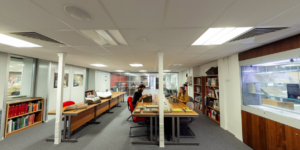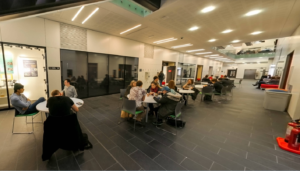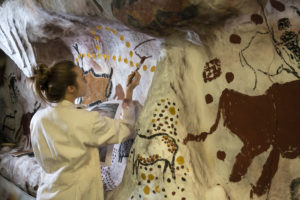Evolutionary Anthropology
UCAS code V4B1
- Study mode
- Full-time
- Duration
- 3 years
- Start date and application deadlines
-
- Start date
UCAS code V4B1
Evolutionary Anthropology represents the deep time perspective of anthropology in the broadest sense. Anthropology encompasses the biological and social study of humans as complex organisms with the capacity for language, thought, and culture.
This unique multidisciplinary programme is the only one of its kind available in the UK and offers an opportunity to study an in-depth programme that explores what it is to be human.
This is based on the study of three major areas of evolutionary anthropology: the archaeology of human evolution, palaeoanthropology, and primatology. You can choose to study all three elements or focus on two areas and add modules in life sciences and earth sciences.
You will be required to complete four weeks of fieldwork including two weeks on our department field school at the end of year one. In year two, many students work on overseas staff research excavations, currently these are based in Zambia, Saudi Arabia, Turkey, Jordan, Greece, Egypt as well as the UK.

We’re proud to announce we’ve been awarded a Gold rating for educational excellence.
Discover what you'll learn, what you'll study, and how you'll be taught and assessed.
Year one modules introduce the archaeology of human origins, archaeological techniques and methods, human anatomy, evolutionary psychology and human and animal behaviour.
Students take 45 credits of required modules and 30 credits of optional modules in semester 1. Students take 45 credits of required modules and 15 credits of optional in semester 2.
Students taking LIFE modules must have A-level Biology.
| Optional modules | Credits |
|---|---|
| BRONZE AGE CIVILIZATIONS: MESOPOTAMIA AND THE MEDITERRANEAN (ALGY106) | 15 |
| LIVING WITH ENVIRONMENTAL CHANGE (ENVS119) | 15 |
| ECOLOGY AND CONSERVATION (ENVS157) | 15 |
Programme details and modules listed are illustrative only and subject to change.
Year two advances on the topics covered in year one via core and optional modules in early technology, art and language, extinction and migration events and responses to climate change.
Students take 30 credits of required modules and 30 credits of optional modules in Semester ONE, and 30 credits of required modules and 30 credits of optional modules in semester two.
Students must complete 20 days of archaeological fieldwork training, normally during the summer vacation period at the end of year one and year two. The fieldwork is assessed on ALGY248.
CLAH222 requires prior approval and is subject to a suitable placement being sourced. Students will not be able to register directly for this module.
Students taking LIFE modules must have A-level Biology.
LIFE211 and LIFE213 are only available on a case-by-case basis, in consultation with Life Sciences, and subject to previously undertaken suitable modules.
Students may take appropriate level 4 modules up to a total of 30 credits with prior approval from the subject lead.
Registration onto HLAC220 is only for students planning to undertake a Work Placement Year.
Programme details and modules listed are illustrative only and subject to change.
In year three you will continue to develop your expertise through the detailed study of early human ancestors and evolution, and increase your breadth of knowledge through modules such as primate biology and African archaeology.
Students take 30 credits of required modules and 30 credits of optional modules in semester one. Students take 15 credits of required modules and 45 credits of optional modules in semester two.
ALGY450 is a ‘year-long’ module and represents 15 credits in each semester.
Students wishing to take LIFE322 must have taken LIFE211 as a pre-requisite.
Students wishing to take LIFE324 must have taken LIFE213 as a pre-requisite.
LIFE322, LIFE335, and LIFE364 are only available on a case-by-case basis, in consultation with Life Sciences and subject to previously undertaken suitable modules.
Students wishing to take ALGY342 must have taken ALGY106 in year one.
With the permission of the subject lead, it is also possible to choose 15 credits from those offered at level 5 so as to fit the themed pathway or support your dissertation.
Students may take 15 credits of optional cognate modules outside of their degree programme with permission from the subject lead.
| Compulsory modules | Credits |
|---|---|
| DISSERTATION (ALGY450) | 30 |
| ARCHAEOLOGY AND HERITAGE IN CONTEMPORARY SOCIETY: ETHICAL AND POLITICAL ISSUES (ALGY399) | 15 |
| PALAEOLITHIC ART IN EUROPE (ALGY361) | 15 |
Programme details and modules listed are illustrative only and subject to change.
Modules are delivered by a mixture of lectures and seminars in year one, in year two the lecture element within modules is complemented by student led seminars. Finally, in year three, most modules are delivered by a short series of lectures with a focus on student-led seminars thereafter. Self-directed study is also expected through the course reading list and conducting research for your essays and projects. Academic staff area regularly available via their office hours for one-to-one feedback and support. Course material is available 24-hours a day on Canvas, our online learning platform, and study support is available from our dedicated student services team.
Evolutionary Anthropology is assessed in a variety of ways.
Examination: learning outcomes are demonstrated in student performance through preparation for and the sitting of an examination. Such examinations may cover essay-based work (usually by selection of a set number of questions), source analysis (usually by selection of questions or a commentary on an ancient source) or language work (mostly translation and commentary of set passages).
Assessed coursework, including essays, commentaries, posters, and projects: learning outcomes are demonstrated in student performance through the preparation and delivery of a piece of work as an act of self-directed learning with full access to all the relevant learning and research tools and supports.
Portfolio: a critical summary of seminars presented by students reflecting on the material discussed in seminars and subsequently researched and presented as a discussion of the topic or theme.
Class tests, primarily in language modules: learning outcomes are demonstrated with regards to understanding, analysing and applying structures and concepts of grammar and syntax.
Oral presentations: modules assess presentation skills and several modules require the use of Microsoft PowerPoint.
We have a distinctive approach to education, the Liverpool Curriculum Framework, which focuses on research-connected teaching, active learning, and authentic assessment to ensure our students graduate as digitally fluent and confident global citizens.
The Liverpool Curriculum framework sets out our distinctive approach to education. Our teaching staff support our students to develop academic knowledge, skills, and understanding alongside our graduate attributes:
Our curriculum is characterised by the three Liverpool Hallmarks:
All this is underpinned by our core value of inclusivity and commitment to providing a curriculum that is accessible to all students.
The qualifications and exam results you'll need to apply for this course.
| Qualification | Details |
|---|---|
| A levels |
BBC |
| BTEC Level 3 national extended diploma |
DDM. |
| BTEC combinations |
BTEC National Diploma DM plus B at A level; BTEC National Extended Certificate D plus BC at A level. |
| Welsh Baccalaureate Advanced |
C in the Welsh Baccalaureate, plus BB at A level |
| Access |
Pass relevant Access to HE Diploma with 45 Level 3 credits with 27 at Distinction and 18 at Merit |
Studying with us means you can tailor your degree to suit you. Here's what is available on this course.
University of Liverpool students can choose from an exciting range of study placements at partner universities worldwide. Choose to spend a year at XJTLU in China or a year or semester at an institution of your choice.
Immerse yourself in Chinese culture on an optional additional year at Xi'an Jiaotong Liverpool University in stunning Suzhou.
Broaden your world by spending an additional year of study at a partner university abroad following your second year of study.
Take a semester of your second year of study at one of our worldwide partner institutions.
Spend a summer abroad on a study placement or research project at one of our worldwide partner institutions.
Every student at The University of Liverpool can study a language as part of, or alongside their degree. You can choose:
The Department of Archaeology, Classics and Egyptology is part of the School of Histories, Languages and Cultures. Teaching takes place across campus, including in specialist facilities in the Central Teaching Hub.






From arrival to alumni, we’re with you all the way:

Want to find out more about student life?
Chat with our student ambassadors and ask any questions you have.
Students who graduate from Evolutionary Anthropology are equipped with skills required for employment or advanced study in archaeology or anthropology. In addition to the subject-specific career pathways, graduates have also gone on to careers in a range of public service and private industry, for example the police, science journalism or financial services. Many past students have progressed through doctoral studies.
Recent employers include:
88% of Archaeology, Classics and Egyptology students go on to work or further study within 15 months of graduation.
(Graduate Outcomes, 2018-19.)
Hear what graduates say about their career progression and life after university.

Jack graduated BSc Hons Evolutionary Anthropology in 2019 and is graduating MRes Palaeoanthropology degree from the University of Liverpool in 2020. He has received an offer to undertake a unique 19-month programme of language study, work placement and homestay in Japan with Daiwa Anglo-Japanese Foundation.
Your tuition fees, funding your studies, and other costs to consider.
Full-time place, per year - £9,535
Year abroad fee - £1,430 (applies to year in China)
Full-time place, per year - £24,100
Year abroad fee - £12,050 (applies to year in China)
The tuition fees shown are correct for 2025/26 entry. Please note that the year abroad fee also applies to the year in China.
Tuition fees cover the cost of your teaching and assessment, operating facilities such as libraries, IT equipment, and access to academic and personal support. Learn more about paying for your studies.
We understand that budgeting for your time at university is important, and we want to make sure you understand any course-related costs that are not covered by your tuition fee. This includes specialist equipment and fieldwork costs.
Students will be required to cover the costs listed below for year one compulsory fieldwork- two weeks in Penycloddiau, North Wales:
In year two, those who must complete a further two weeks of fieldwork have several options with varying costs. Some options are based in the UK and have no additional costs, others are based abroad. For those choosing to join a site abroad, students will be expected to pay for their own flights, accommodation, and sustenance. The costs for this vary from site to site.
We offer a range of scholarships and bursaries that could help pay your tuition and living expenses.
If you’re a UK student joining an undergraduate degree and have a household income below £35,000, you could be eligible for a Liverpool Bursary worth up to £2,000 for each year of undergraduate study.
Apply for an Asylum Seekers Scholarship and you could have your tuition fees paid in full and receive help with study costs. You’ll need to have applied for asylum in the UK, or be the dependant of an asylum seeker, and be joining an eligible undergraduate degree.
If you’ve spent 13 or more weeks in Local Authority care since age 14, you could be eligible for a bursary of £3,000 per year of study. You’ll need to be a UK student joining an eligible undergraduate degree and be aged 28 or above on 1 September in the year you start.
Are you a UK student with a Black African or Caribbean heritage and a household income of £25,000 or less? You could be eligible to apply for a Cowrie Foundation Scholarship worth up to £8,000 for each year of undergraduate study.
If you’re a UK student identified as estranged by Student Finance England (or the equivalent UK funding body), you could be eligible for a bursary of £1,000 for each year of undergraduate study.
Joining a School of Biosciences degree and have a household income of less than £25,000? If you’re a UK student, you could apply to receive £4,500 per year for three years of your undergraduate course.
Do you live in the Liverpool City Region with a household income of £25,000 or less? Did neither of your parents attend University? You could be eligible to apply for a Nolan Scholarship worth £5,000 per year for three years of undergraduate study.
Are you a UK student with a household income of £25,000 or less? If you’ve participated in an eligible outreach programme, you could be eligible to apply for a Rigby Enterprise Award worth £5,000 per year for three years of your undergraduate degree.
Are you a UK student with a household income of £25,000 or less? Did neither of your parents attend University? You could be eligible to apply for a ROLABOTIC Scholarship worth £4,500 for each year of your undergraduate degree.
Apply to receive tailored training support to enhance your sporting performance. Our athlete support package includes a range of benefits, from bespoke strength and conditioning training to physiotherapy sessions and one-to-one nutritional advice.
Joining a degree in the School of Electrical Engineering, Electronics and Computer Science? If you’re a UK student with household income below £25,000, you could be eligible to apply for £5,000 a year for three years of study. Two awards will be available per academic year.
If you’re a young adult and a registered carer in the UK, you might be eligible for a £1,000 bursary for each year of study. You’ll need to be aged 18-25 on 1 September in the year you start your undergraduate degree.
Use our handy chatbot for your Clearing enquiries.
Last updated 17 June 2025 / / Programme terms and conditions